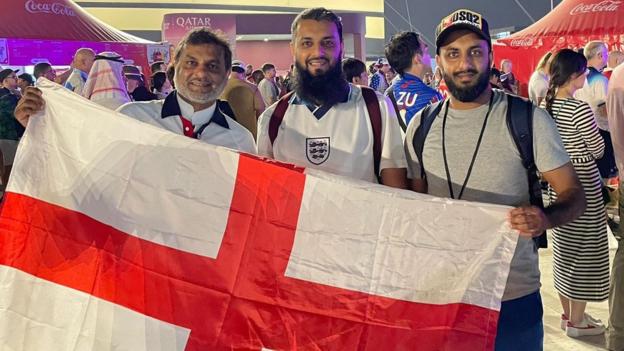

At about 4.30am every day in Doha, the Adhan echoes around the city.
After hearing the Islamic call to prayer, worshippers make their way to their local mosque for Fajr (dawn) prayers.
At the same time, World Cup visitors are climbing back into their beds having left the Fifa fan festival – where matches are shown on big screens, then concerts staged – when it closes at 2am.
Qatar has a population of fewer than three million people and more than 2,000 mosques, and a contrast in culture has been brought to the country for the first major international football tournament to be held in a Muslim state in the Middle East.
“It feels so special seeing the excitement and smiles of the fans,” fan festival director Mead Al Emadi told BBC Sport. “We have welcomed people from all backgrounds and cultures to celebrate the best of football here.
“Seeing how much people are enjoying themselves is the intangible legacy of the World Cup. As a Qatari woman who loves her football, working on this project for the past 10 years, then delivering it, is something that has been beyond my wildest dreams.”

Qatar is a conservative country but Sharia law is firmly entrenched in its constitution – homosexuality is illegal, and the consumption of alcohol is prohibited in public.
Surrounded by visitors from around the world, Qataris have stuck to their traditions and beliefs – men, women and children are seen at matches in their thobes and abayas (long robes) but with face paint and carrying scarves and flags.
Every stadium has designated prayer rooms, including the media centres, which are often packed when the time is approaching for the next of the five daily prayers, and the Khalifa International Stadium has a purpose-built mosque within its perimeter.
During England’s first training session in Doha, the Maghrib (sunset) Adhan could be heard; at one Brazil game at Stadium 974, the imam was seen wearing a Neymar shirt; and during the last group game at Al Janoub, a group used a Uruguay flag as a prayer mat.
“If the World Cup hadn’t been held here, we probably wouldn’t have come [to Qatar],” says Faizal, who has travelled from Yorkshire with his father and brother.
“The prayer facilities here make it very easy for us, whether it’s in the fan festival, the souq or the stadium. It has been lovely to see tourists from all over the world attending the mosques and having a genuine interest in Islam and the Arab culture.
“Halal food is a must for us and would most likely be a struggle in other countries, so having access to halal food wherever we are is such a huge benefit to us.”
Three of the stadiums have also been equipped with sensory rooms, giving fans with access requirements the opportunity to experience the game away from large crowds and loud music.
Qatar has spent billions on infrastructure for the tournament, including the stadiums, multi-lane motorways and a brand new metro system.
Organisers have consistently claimed three migrant workers died on stadium sites, with 37 further fatalities of stadium workers off-site due to non-work reasons, and disputed a report alleging as many as 6,500 migrant workers have died.
Late last month, World Cup chief Hassan Al Thawadi told TalkTV an estimated 400-500 migrant workers died “as a result of work connected to the World Cup”.
However, Qatari officials quickly sought to clarify that figure, saying it was an estimate for fatalities across all industry sectors, not just infrastructure sites linked to the tournament.
With the most remote of the stadiums just 40 miles from the centre of Doha, there were questions before the World Cup about how the infrastructure would cope.
After an initial issue with the Fifa ticketing app on day two – causing issues for hundreds of fans going to the England and Wales games – stadium access has largely gone well.
With some of the stadiums a walk of 20 minutes or so from a metro station, hundreds of staff have been on hand to point people towards the venues, then shout “metro, this way” while pointing with giant foam fingers after the matches.
England fan Ben lives in Doha, and attended the first game at Al Bayt – the stadium furthest outside the city.
“The logistics around the stadium were very smooth,” he said. “There were loads of buses getting us to the ground from the metro and loads of buses to get us back.
“Getting into the ground was smooth, too. The queue was long but it moved steadily and we were inside in about 20 minutes.
“But no food or water was available in the concourse near us, which was a bit of a farce.”
Holly, an England fan who travelled for the group stage, said: “What has really surprised is the ease to get to the stadiums and around the city. The metro has been brilliant and you hardly have to wait.”
Another England supporter said fans could get to most stadiums quite easily, but the ones further away were “quite difficult to navigate”.
The longer-term legacy of the tournament will be felt once foreign fans have returned home, though, and a Brazilian man who has lived in Qatar for eight years told us the construction of the metro system will have a particular impact.

Qatar has a low crime rate, so being pickpocketed or mugged in the street is unlikely. But security has been heavily bumped up for the tournament, with plenty of police officers patrolling the metro and stadiums.
Japan supporter Take said he felt “much safer here” than in Brazil eight years ago.
“You had to check your bags everywhere you went,” he said as he reflected on his experience in 2014. “Here, nothing.”
England fan Mike said: “This is a World Cup like no other – it is so different, but it has been brilliant. I went to the fan festival and there were so many fans around enjoying the occasion.
“Obviously you don’t have the drinking, and there hasn’t been any trouble. It all feels so safe.”
Another England fan, Holly, added: “There were concerns about coming, but I have really enjoyed it. It is a very different atmosphere to what we are used to at football in England.
“There being no drink and no large groups of fans has made it a bit of a carnival atmosphere. I haven’t seen lots of European fans about, but the South Americans have more than made up for that.”
In the build-up to the tournament, it was unclear how many supporters would travel to Qatar and what the atmosphere was going to be like at matches.
It is estimated more than one million fans have made the journey, and very few matches have looked significantly undersubscribed. Indeed, Fifa said attendance for the group stage had been an average of 96% of stadium capacity.
The majority of games have been full of the colour, passion and noise you would expect at any major tournament, though there have been others that have prompted people to post on social media they have felt “flat” or “artificial”.
The most obvious difference when compared with previous tournaments has been a reduction in the number of European fans. While the likes of Brazil and Argentina look to be represented everywhere you go, it is unusual to see a supporter wearing a European football shirt away from the stadiums.
A Germany fan we met before their draw with South Korea said the atmosphere at European games had been “disappointing” and there was a huge contrast to the 2006 tournament in his homeland, where fan parks had “100,000 in every day… here it is only 30,000 at the Corniche”.
Many supporters have been impressed by the atmosphere in the stadiums, though, with Brazil fan Dulce – who has lived in Doha for five years – saying it was “as good as ever”.
“We have really loved it,” she said. “I am told there are about 30,000 Brazil fans who have come from South America, and 38,000 from Argentina. This is usual.
“Just listen to the noise. You could be anywhere in the world and this noise is as loud and as good. I am excited by what will happen later in the World Cup.”
While we have been speaking to supporters who have chosen to travel to Qatar, there are, of course, many fans who have stayed away, with the decision to stage the World Cup in a country where homosexuality is illegal heavily criticised.
Organisers have always maintained all visitors would be welcome regardless of race, religion, gender or sexuality, but they also said they expected their laws and culture to be respected, and many LGBTQ+ fans said they had not received the assurances over safety they needed.
Days before the World Cup kicked off in Qatar, a fan group said football is “leaving behind” its LGBT supporters.
A gay fan wrote in a diary for BBC News that, although he has never felt concerned for his safety in Qatar, locals “don’t consider gay fans as part of the equation”.
A transgender Qatari woman also told BBC News: “I am very afraid, but I just want people to know that we do exist.”
BBC News journalist Shaimaa Khalil wrote from Doha: “It does feel like there are two parallel universes when it comes to the controversies around this World Cup.
“For the advocates, the activists, the European teams and especially the seven captains who had intended to wear the One Love armband, this is an LGBT and human rights issue they want to remain vocal about.
“For hosts Qatar, and those spectators who’ve come here or who are watching around the Arab world – which has a vast Muslim majority – this is about religion, culture, the norms of the region and mostly about respect which they don’t feel they’re getting.”
Alcohol cannot be consumed in public in Qatar, while ordinarily it is only available to purchase at certain hotels or if you have a licence.
Just two days before the start of the tournament, Fifa changed its policy and decided that alcohol would not be sold at the eight stadiums.
The tournament has been mainly trouble-free, apart from an incident which appeared to show a fight between Argentina and Mexico supporters.
In Msheireb – the downtown area of Doha where there are a number of restaurants with al fresco dining – we spoke to a fan with a Scotland shirt on and his two friends enjoying a soft drink.
Asked how he has felt without alcohol being easily accessible, he said: “It hasn’t been a problem at all. In fact, it’s made us feel a bit better.”
An Ecuador fan, who now lives in Saudi Arabia, said they drink alcohol in his home country and it is a “big way of life”. He admitted it had been “very hard for a few weeks” after he moved to adjust to not drinking alcohol and having parties, but he is used to how it is in Qatar and now has an alternative.
“Here, coffee is like our beer,” he said. “People are lining up for ages for coffee.” – bbc.com